7. Blue Spring (Toshiaki Toyoda, 2001)
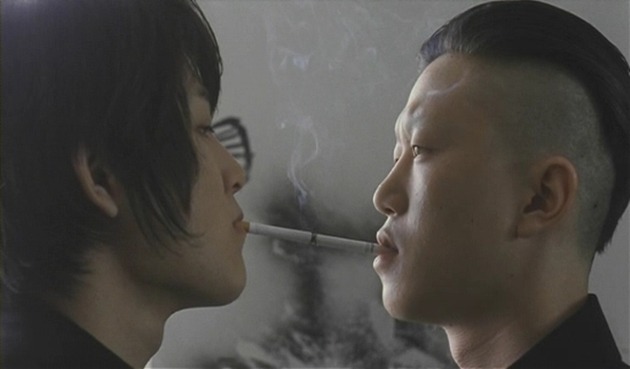
The script for this film is based on a series of autobiographical short stories by the manga author Matsumoto Taiyo, and takes place in an all-boys school. The protagonist, Kujo, becomes the leader of a seven-member gang of the school’s seniors by winning a suicidal clapping game.
Initially, he seems to cherish his role, punishing those who do not treat the rest of the gang members with respect, occasionally using a baseball bat to do so. However, after awhile he gets bored, a tendency that expands onto everything he does.
Aoki, a childhood friend of Kujo’s, becomes his right hand; nevertheless, he actually functions as a subservient, unable to decide anything without asking him first. Eventually, Kujo starts to ignore him and he erupts.
Another member of the gang had set as his life’s goal for the school’s baseball team to advance to the national tournament. However, when the team fails, he becomes depressed to the point where he cannot find any reason to continue living. Another member has no goals at all and just watches time pass by until he also erupts.
A special case in the school is “The Ghost”, a name used by all involved, including the teachers, due to his terminal illness.
Toshiaki Toyoda directs a film concerning the issues of adolescent life; however, both his characters and the general situation are extreme in their conception, thus making the film stand apart from similar movies. Moreover, his views on the various subjects are present in the film. Nevertheless, it takes quite a bit of thinking to understand them and at the same time, they are open for interpretation.
The cast includes a number of actors that later became stars, including Ryuhei Matsuda, Hirofumi Arai, Eita and Kyoko Koizumi.
8. 2LDK (Yukihiko Tsutsumi, 2003)
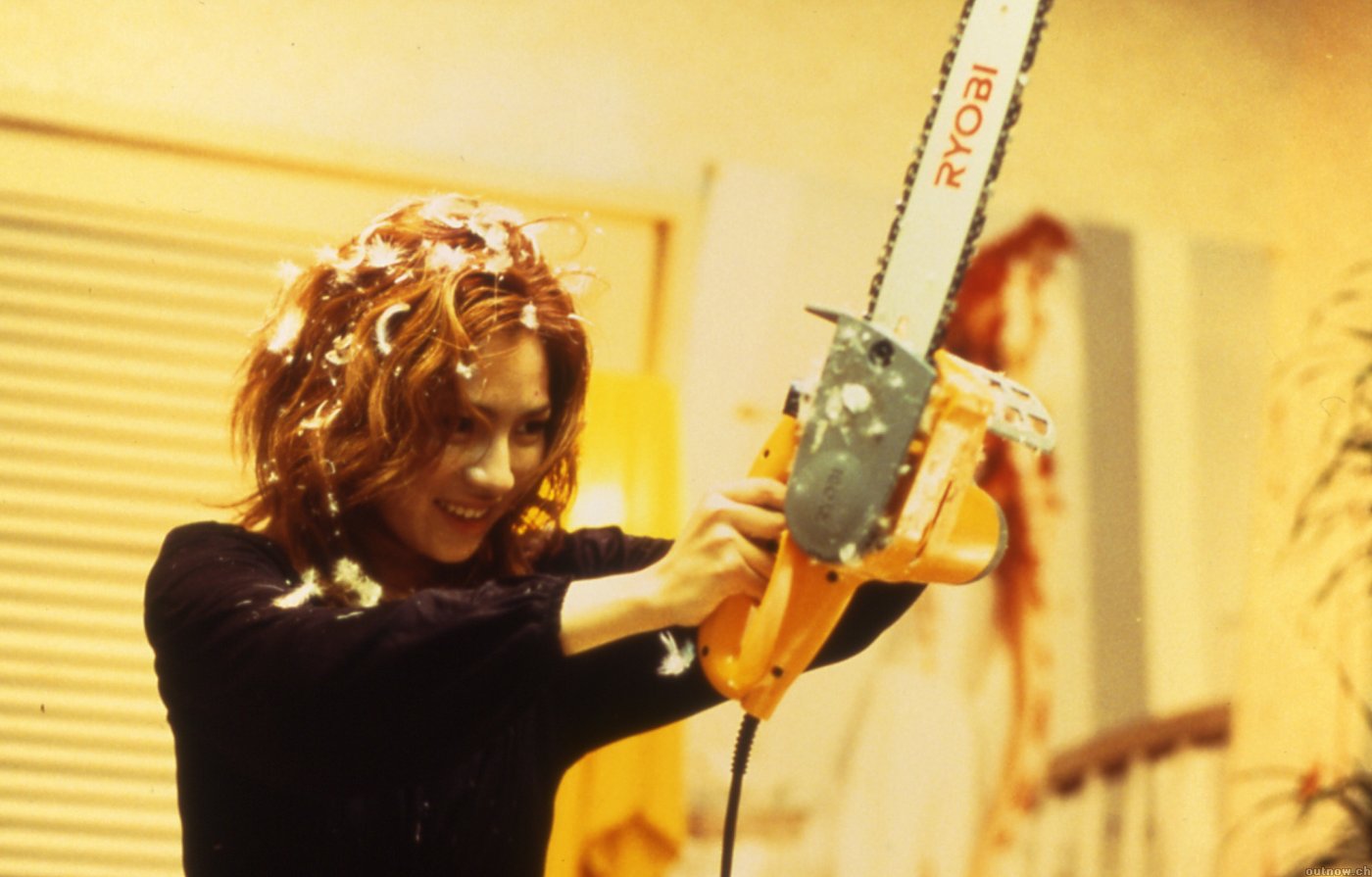
In 2002, on a night in Berlin filled with alcohol, producer Shinya Kawai (The Ring), challenged directors Ryuhei Kitamura and Yukihiko Tsutsumi to a duel in filmmaking, with a number of peculiar rules:
1.The duration of the films ought to be 60 minutes, plus or minus 10 minutes.
2.The film could not be R rated.
3.The entire story was to be shot on a single set.
4. It could not have more than two characters
5. Kitamura was to cast male and Tsutsumi female protagonists
6. The movie was to be completed in a week, with an equal and miniscule budget
7. At least one of the characters was to die
The venture’s name was Dual Project.
2LDK is the Japanese acronym for an apartment with two separate bedrooms and a common living room, dining room and kitchen. In such an establishment live two actresses, Nozomi and Lana, both of whom have signed with the same agency and are currently competing for the same leading role in the movie “Yakuza Wives”. Moreover, they both believe that the role is set to launch their careers.
However, the differences between them are evident. Nozomi is a simple, demure girl from a small island, who came to Tokyo to improve her life, both socially and professionally. Lana, on the other hand, has the looks of a fashion model, is popular among men and is unscrupulous in achieving her goals.
Furthermore, Nozomi is obsessed with cleanliness and order, and Lana is a slob. The only notion they seem to have in common is the fact that they both hate each other. However, they act in a civilized way, up to a point when they both erupt, thus resulting in absolute mayhem.
Yukihiko Tsutsumi’s script and direction are sublime, particularly considering the difficulty of the project. Undoubtedly, his biggest achievement is that he manages to analyze his characters to such an extent in only 70 minutes. Equally accomplished is the ending that gives the term “tragic irony” an actual meaning.
Eiko Koike and Maho Nonami as Nozomi and Lana, respectively, are excellent in their parts, and in reality are the exact opposite of their actual personas, since Koike is the pop idol and Nonami the genuine actress. Their depiction of a variety of sentiments including calmness, irritation, rage, hysteria, and paranoia is one of the film’s biggest assets.
9. Snakes and Earrings (Yukio Ninagawa, 2008)
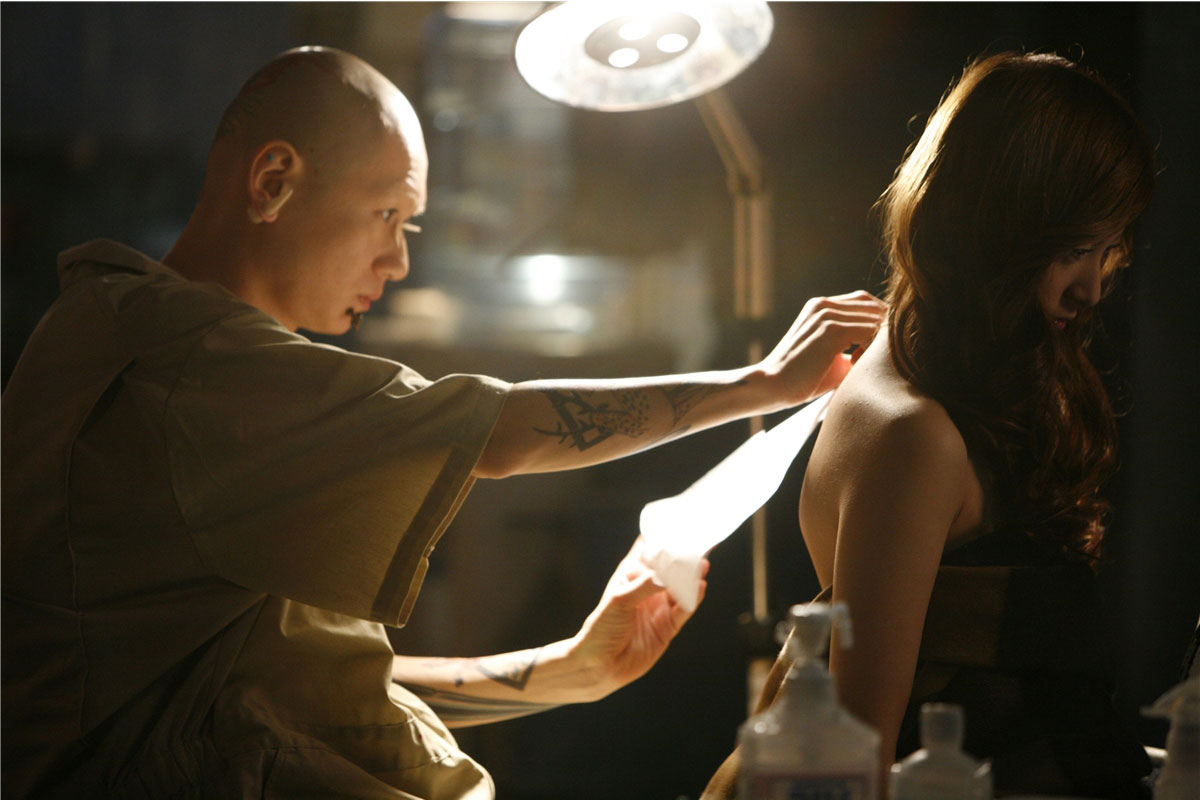
This particular film is based on the homonymous Akutagawa-Award winning novel by Hitomi Kanehara.
Lui is the archetype of the trendy girl. She dresses only in brand-name clothes, she always wears makeup, and she has an elaborate manicure. However, in terms of her mindset, she differs from similar looking girls, primarily due to her peculiar taste in men. One night, when attending a club on her own, she meets Ama, who correspondingly is the archetype of the punk boy. He has dyed red hair, piercings all over his face and tattoos all over his body.
Nevertheless, his distinct mark that initially attracts Lui is his forked tongue. The attraction is mutual and the two spend the night together, becoming a couple from the very beginning.
Lui expresses a wish to acquire a forked tongue as well, and Ama introduces her to Shiba, who was responsible for his. He gives her a tongue piercing that she is going to enlarge gradually, until her tongue is split in two. However, the second time she visits his parlor and asks him to draw her a tattoo, he proposes having sex instead of paying and she agrees.
From that point on, a peculiar erotic triangle is created, chiefly because Lui, although she is truly in love with Ama and even moved in to his apartment, equally enjoys the sadistic sex with Shiba.
Yukio Ninagawa presents an elaborate adaptation of the book, splendidly transferring the atmosphere of the novel to the silver screen, particularly the characters that are quite similar to the ones described by Hitomi Kanehara. Also of note is the aesthetics of the film that contain graphic scenes of sex and mutilation, in a way that does not come out as grotesque.
The nouvelle vague of the time is present in the film, including Yuriko Yoshitaka, Kengo Kora, and Arata, who is the one that stands apart as the terrifying, disillusioned sadist Shiba.
10. Zen (Banmei Takahashi, 2009)

“Zen” is a biographical film, based on the life Dogen Zenji, a Japanese Buddhist monk who lived during 1200 and 1253 and was the founder of Soto Zen.
The film begins with Dogen traveling to China, seeking answers for his spiritual queries that he could not find in Japan. During his travel, he meets a monk named Ji Uen, who, after listening to his questioning, advises him to become a student of Rujing, who taught Caodong (the Chinese term for Soto Zen) in a monastery at Tiantong Mountain. While there, Dogen pores over the continuous, silent meditation, where he finally discovers the answers he was searching for, with the assistance of an old monk who is the quartermaster of the monastery.
When he reaches his 27th year and having completed his training, he decides to return to Japan. In Kyoto, he establishes his school, which initially has just a few members; including Ji Uen, who arrives from China to assist him, Shunryo, a young monk that takes on the quartermaster role, and Ejo, his second in command.
However, the troubles begin when Dogen reacquaints with Orin, a woman he had saved from death when she was a girl, who now works as a prostitute. Furthermore, monks from other sects, chiefly the ones from the Hiezan monastery, have turned against him.
Banmei Takahashi directs in a way similar to the Zen philosophy, with scarce dialogue, a slow pace and almost zero exaltation. However, he manages to produce a highly entertaining art film that largely focuses on philosophy rather than facts.
Kantaro Nakamura, a famous Kabuki actor, plays Dogen, and his quality as an actor is evident through the duration of the film. Takahashi based the movie on his performance and he delivered in an astonishing fashion.
11. Shangri-La (Takashi Miike, 2002)
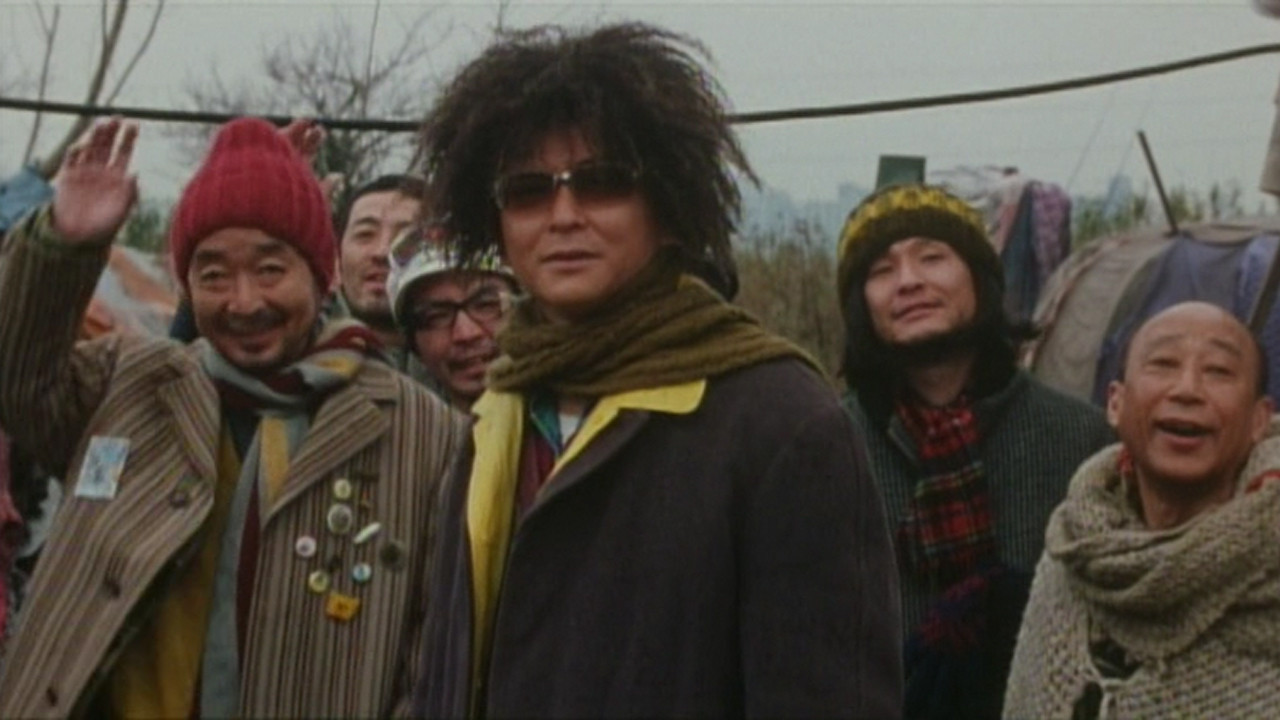
This particular movie is one of the lesser-known films by Takashi Miike, since it was never released on DVD in the US.
Shangri-La is the name given to a narrow piece of land by the sea by the people living there, all of whom are homeless. Their leader is a peculiar individual with an Afro, who constantly wears sunglasses and who everyone calls The Mayor.
Gangs of criminals attack the homeless because they aspire to use their area to dump garbage. However, a passerby saves the homeless by pretending to be a cop, showing them a badge that is actually his postal booklet. He subsequently becomes a resident of Shangri-La, under the nickname Deputy.
The next day, the two of them prevent an owner of a printing house from committing suicide, due to the bankruptcy of the company that chiefly financed him, which led to his own bankruptcy. Together they form a scheme to shake down the corrupt president of the aforementioned company, in order to restore the printing house of the currently named President.
Takashi Miike masterfully directs a rather common script based on the homonymous manga by Yuji Aoki, who also plays a lawyer in the movie. Although his usual extreme violent themes aren’t present here, his unique sense of humor is quite evident, particularly in two scenes. The scene with the motorcycle gang attack, whose members ride small, automatic motorbikes, and the extortion scene, when The Mayor asks the victim if he would like a receipt, are both notable.
Sho Aikawa is superb as The Mayor, largely acting as an anime character.
12. The Blue Light (Yukio Ninagawa, 2003)
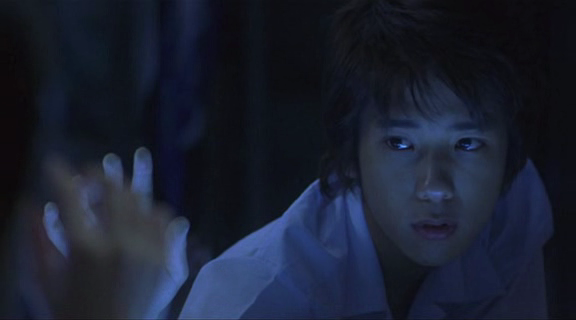
Based on the novel with the same title by Yusuke Kishi, this particular film focuses on Shuichi Kusimori, a highly intelligent high school student with substantial family problems. His father was killed when Shuichi was still an infant and his mother remarried Ryuji Sone, who also had a daughter from a previous marriage, named Haruka. However, Sone proved to be a violent alcoholic, often abusing the rest of the family.
After a time-consuming struggle, Yuko eventually managed to divorce him; nevertheless, she kept Haruka under her protection. For a time, the three of them led a peaceful life, having acquired a balance to their relationship. Alas, Sone reappears in their lives and Yuko, instead of kicking him out, she grants him a room in the house.
Shuichi is extremely bothered by that fact, a sentiment that increases after Sone acts out toward Haruka and has sex with his mother. After consulting with a lawyer, who informs him that he can do nothing legally, he decides to take the situation into his hands.
Yukio Ninagawa manages to elaborately portray all the social relationships taking place in the story: the one between spouses, between parents and their offspring, between friends and between young couples. Even more impressively, he accomplishes that through the perspective of a 17-year-old, whose emotional frustration is the backbone of the movie.
Also of note are the highly intelligent script and the cinematography, where the blue color dominates the majority of the shots, in an evident connection with the title.
Kazunari Ninomiya is impressive as Shuichi, in one of his initial roles in cinema.
13. Rockers (Takanori Jinnai, 2003)
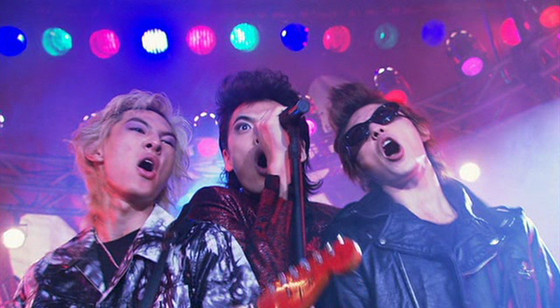
“Rockers” is about a four-member band that vainly tries to become famous, since it has only one fan. Jin, the lead singer and guitar player, wants to be a star to escape his father’s pressure to become a carpenter. Gaku, the bass player, had a dream from childhood, to be able to fly. In that aspect, he constantly eats bird food, a tactic that results in regular vomiting and permanent stomachaches.
Momo, the drummer, used to draw tattoos with the names of the women he fell in love with, and when they did not respond, he would cross the name out. The tactic has resulted in him having an arm full of crossed out names. Lastly, Ko, the guitar player, had a number of issues with his sisters as a boy; they used to put makeup on him and dress him up in girl’s clothes, a tactic that resulted in him looking feminine, even now.
One day, Jin’s father, during a fight between them, breaks his guitar and sets it on fire. Due to this, the band holds an audition for a new guitar player, thus resulting in the appearance of Tani, who would turn out to be the factor that changed the band’s course.
The film is loosely based on the actual story of the Rockers, a Japanese punk band from the 80s, whose leader was Takanori Jinnai, the director and screenwriter of this particular film.
Although he retains a number of incidents from the band’s actual story, the script actually has little to do with reality, since Jinnai uses a number of surrealistic episodes, slapstick humor and a large amount of self-mockery. Thus, “Rockers” is a highly entertaining comedic film and not a documentary of any sort regarding the Japanese punk scene.